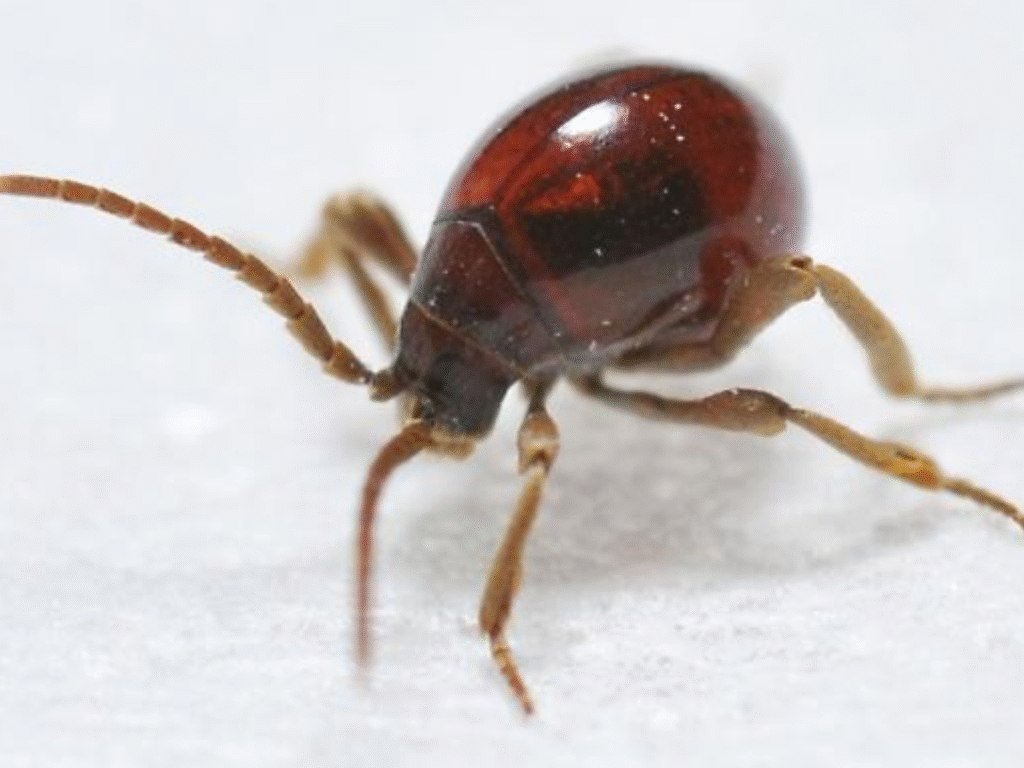What Are Spider Beetles?
Spider beetles are a lesser-known household pest that often surprise homeowners with their odd appearance and sneaky habits. They’re tiny insects that resemble small spiders because of their long legs and rounded bodies. While they aren’t as common as ants or roaches, they can still cause trouble if they infest your home.

What Are Spider Beetles?
Spider beetles are part of the beetle family. They’re usually reddish-brown to black, oval-shaped, and only about 1–3 mm long. Their long legs and antennae give them a spider-like look, which is where they get their name. Unlike true spiders, however, spider beetles are beetles and can’t spin webs.
Spider beetles often make their way into homes by hitching a ride on infested products. Dry goods such as flour, rice, cereals, or pet food can already contain eggs or larvae when purchased. Once inside, they spread to other food sources and storage areas.
They can also come from outdoors. Bird and rodent nests around attics, chimneys, or wall voids provide ideal breeding grounds. From there, spider beetles wander into living spaces looking for food. They prefer dark, quiet spaces and are often found in pantries, cupboards, attics, or even inside walls.
Are Spider Beetles Good or Bad?
In nature, spider beetles play a role in breaking down organic material, but inside your home, they’re definitely unwanted. They can contaminate stored foods such as grains, flour, pet food, dried fruit, nuts, and even spices. Once an infestation begins, it can spread quickly and ruin pantry goods. So while they serve a purpose outdoors, indoors, they’re considered pests.
You don’t want them in your home. Get professional pest control services to keep them out for good.
How to Tell if You Have a Spider Beetle Infestation
Because spider beetles are tiny and active at night, they can be tricky to spot at first. Still, there are a few clear signs that point to an infestation:
- Damaged or contaminated food: Open packages of flour, rice, cereal, pet food, or dried goods may have beetles, larvae, or shed skins inside.
- Live sightings: You may notice small, reddish-brown beetles crawling around pantries, cupboards, or storage areas, especially when you move items around.
- Droppings and cast skins: Like other stored product pests, spider beetles leave behind droppings and shed skins, which contaminate food.
- Musty odors: A large infestation may create a stale, musty smell in your pantry or storage spaces.
- Unexpected hiding spots: Spider beetles can also appear in places without food, such as attics or behind walls, especially if there are old nests or organic debris to feed on.
If you see more than one or two of these signs, there’s a good chance you’re dealing with an active infestation that needs attention.
How Alta Pest Control Can Help
Spider beetles may be small, but they’re persistent and hard to eliminate on your own. At Alta Pest Control, we help homeowners protect their food storage and living spaces from pantry pests like spider beetles. Our team uses family- and pet-friendly treatments to remove the infestation and prevent it from coming back. Getting rid of spider beetles is simple with Alta Pest Control.
Is the Spider Beetle Poisonous?
Spider beetles are not poisonous. They don’t bite humans or pets, and they don’t spread disease. The main concern with spider beetles is food contamination. If they infest your pantry, they can render food unsafe to eat because of droppings, shed skins, and dead insects left behind.
Why Do We Have Spider Beetles?
There are a few reasons why these pests decided to call your living spaces home, and most of them come down to food. Spider beetles are scavengers, and they’ll eat almost anything they can find. Pantries with open bags of flour, cereal, or pet food are an easy target. They’ll also feed on dried fruit, nuts, and even fabrics or feathers if nothing else is available.
This wide diet explains why spider beetles show up in places you wouldn’t expect, like attics, basements, or storage areas with old boxes and organic debris. If they can find a food source, they’ll settle in and multiply.
How Do You Prevent Spider Beetles?
The best way to prevent spider beetles is to cut off their food supply and hiding places. Here are a few simple steps you can take:
- Seal your food: Keep dry goods in airtight containers made of glass, metal, or thick plastic.
- Check your pantry often: Rotate older items to the front and throw out expired goods.
- Clean up crumbs: Wipe down shelves and sweep floors regularly to remove food particles.
- Inspect before storing: Look for holes, damage, or pests in food packaging before bringing items home.
- Keep storage areas dry: Spider beetles prefer damp or musty conditions, so use dehumidifiers if needed.
- Remove nests or debris: Bird nests, rodent nests, or other organic material in attics and walls can attract spider beetles.
By staying on top of food storage and home cleanliness, you’ll make it much harder for spider beetles to settle in. Contact Alta Pest Control today if you already have spider beetles in your home. We take care of beetles and more pests!
